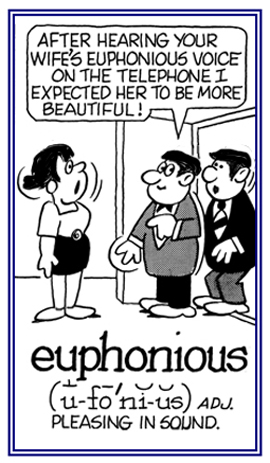phon-, phono-, -phone, -phonia, -phonic, -phonetic, -phonous, -phonically, -phonetically, -phony +
(Greek: sound, voice, speech, tone)
This phono-, phon- should not be confused with another phono-, phon- that means "slaughter, murder, homicide". In Greek, a distinction is made between the phonos (PHOH nohs), "murder", which is spelled with the Greek letter omicron in the last syllable; and the Greek phonos (phoh NOHS), "voice", which is spelled with the letter omega in the last syllable. Both omicron and omega became the letter "o" in English.
dodecaphony, dodecaphonic
Relating to, composed in, or consisting of twelve-tone music.
Divination by interpreting the crackle sound of a laurel branch on a fire; daphnomancy: At the party, the guests played dophonomancy while sitting around the fireplace listened to the snapping noises of the laurel branches burning in the flames.
dysphonia
1. Difficulty in producing articulate speech sounds.
2. Impairment of the voice manifested by hoarseness or other defects of phonation due to organic, functional, or psychic causes.
3. Difficulty in speaking; hoarseness which may be due to public speaking.
2. Impairment of the voice manifested by hoarseness or other defects of phonation due to organic, functional, or psychic causes.
3. Difficulty in speaking; hoarseness which may be due to public speaking.
The term also refers to the change or breaking in the voice of boys during puberty.
dystrophoneurosis
Defective nutrition caused by disease of the nervous system.
earphone
Any device that converts electrical energy into sound waves and is worn over or inserted into the auditory opening; such as the ear.
echophony, echophonia
A duplication of the voice sound occasionally heard during auscultation of the chest.
electrocardiophonogram
The record obtained by electrocardiophonography (a method of electrically recording the heart sounds).
This record provides information about the part of the heart that triggers each heartbeat (the pacemaker), the nerve conduction pathways of the heart, and the rate and rhythm of the heart.
electrocardiophonographic
A reference to a method of electrically recording the sounds of the heart.
electrophone, electrophonic, electrophonically
An instrument that produces musical tones by means of oscillating electric circuits; such as, a theremin, a musical instrument with electronic tone generation, the pitch and tone volume being controlled by the distance between the player's hands and two metal rods serving as antennas or it is also defined more simply as, an electronic musical instrument, played by moving one's hands through electromagnetic fields created by two metal rods.
encephalophone
An apparatus that emits a continuous hum whose pitch is changed by interference of brain waves transmitted through oscillators from electrodes attached to the scalp and that is used to diagnose abnormal brain functioning.
epiphonema
An exclamatory sentence or an especially striking summary comment concluding a discourse.
A purely melodic instrument of the electronic family typically played by moving the right hand between two projecting electrodes with the left hand controlling dynamics and articulation; also known as a theremin.
euphonic
The descriptive word for a pleasant sound
euphonious (adjective), more euphonious, most euphonious
Descriptive of pleasing sounds: Sherry was glad that Dr. Davis, her family doctor, had a very euphonious voice which quieted her down because she was always so nervous when she went to get her yearly vaccination.

© ALL rights are reserved.
Go to this Word A Day Revisited Index

Go to this Word A Day Revisited Index
so you can see more of Mickey Bach's cartoons.
euphonize
To make euphonious.
Cross references of word families related directly, or indirectly, to: "talk, speak, speech; words, language; tongue, etc.":
cit-;
clam-;
dic-;
fa-;
-farious;
glosso-;
glotto-;
lalo-;
linguo-;
locu-;
logo-;
loqu-;
mythico-;
-ology;
ora-;
-phasia;
-phemia;
phras-;
Quotes: Language,Part 1;
Quotes: Language, Part 2;
Quotes: Language, Part 3;
serm-;
tongue;
voc-.


